Universities announce fees above £9,000 limit
- Published
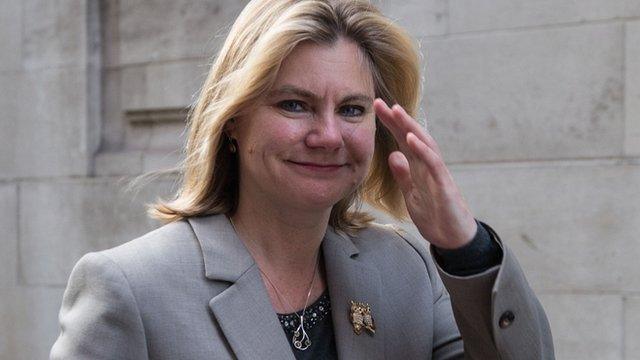
Justine Greening has plans to allow universities with high quality teaching to raise fees
Universities in England are already announcing a tuition fee increase above the £9,000 limit before Parliament has even finished debating plans which would pave the way to raise fees.
Tuition fees for 2017 are listed on Durham, Kent and Royal Holloway websites as £9,250.
MPs will vote in the autumn on whether to allow an increase in tuition fees.
The government will support an increase if universities can show they have high quality teaching.
Announcing a higher level of fees of £9,250 was attacked as "disgraceful arrogance from some universities" by the Liberal Democrat education spokesman John Pugh.
The proposal to raise fees is "not a done deal", says Mr Pugh.
New fee level of £9,250
Sally Hunt, leader of the UCU lecturers' union, said: 'Those universities foolish enough to advertise higher fees will be doing nothing to quell concerns from students and parents that they are simply after as much cash as they can get."
The higher level fees now being advertised are for undergraduate courses starting in autumn 2017.
Students will start applying for these courses after the summer holidays.
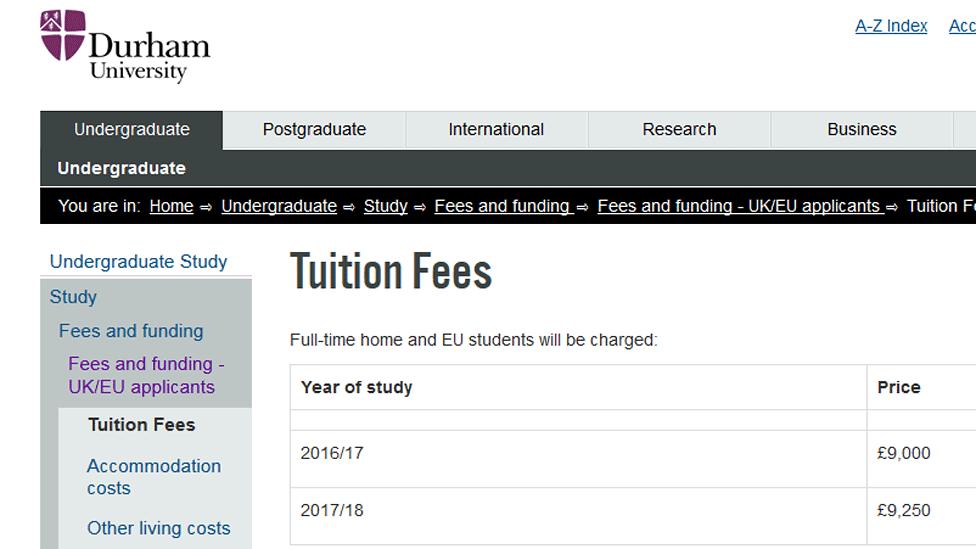
The next wave of university applicants are being told that fees will be £9,250
There are references on university websites to fees being "subject to government confirmation" and "inflationary changes", but this comes before MPs have voted on legislation which will link fee increases to standards of teaching.
There will also be a separate vote by MPs in the autumn on whether to permit an increase in tuition fees above £9,000.
Under the government's proposals, if universities meet a threshold of good-quality teaching, they will be able to increase fees with inflation, which for 2017 is calculated as allowing an extra £250.
'Back door' increase
At this rate, tuition fees could be over £10,000 within the next four years.
The plans in the Higher Education and Research Bill are before Parliament and in a debate on Tuesday, Labour's Gordon Marsden warned this inflation link meant there was no guarantee on how high fees could rise.
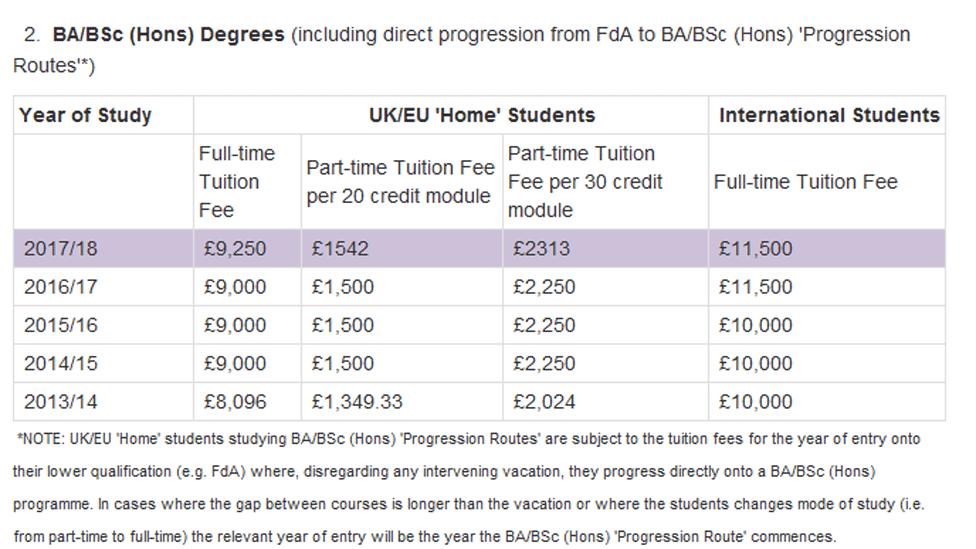
Bishop Grosseteste University are advertising higher fees for students applying in the autumn
The process that will be created to measure teaching quality in universities is called the "teaching excellence framework".
This framework does not yet exist, but for its first year the government has said that almost all universities will be assessed as having reached a quality threshold, allowing them to push their fees above the £9,000 upper limit.
It means that almost all universities will be able to charge £9,250 for their autumn 2017 intake, making it in effect the new upper limit.
Labour's shadow education minister Gordon Marsden said it was a "back-door attempt to raise fees, without a proper and open debate in Parliament, by linking it to a teaching excellence framework which hasn't yet been defined".
But the Liberal Democrats' Mr Pugh said "The real question is whether government is giving these institutions the green light to advertise higher fees.
"They've not even shown their plans for linking fee rises to Parliament. So why are they giving universities the impression that they will pass their teaching quality assessment?"
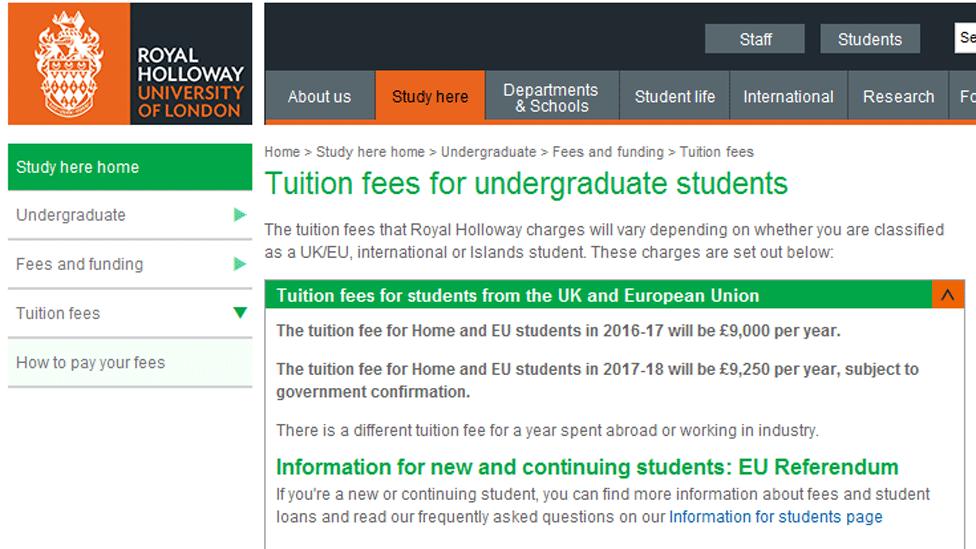
Royal Holloway says that fees will be £9,250, subject to "government confirmation"
The University of Kent said the fee increase represented inflation of 2.8%, which could be applied "where higher education providers achieve a rating of 'meets expectations' under the teaching excellence framework".
A statement said it had published the higher fee "to ensure that both potential students and existing students are provided with as much notice as possible" and to comply with consumer protection guidelines.
Protecting funding
Durham University issued a statement saying it was setting fees in line with what the government was going to allow and said "we are required to provide comprehensive and transparent information to applicants".
Responding to MPs' concerns about tuition fee increases, Education Secretary Justine Greening told the House of Commons on Tuesday: "This will rightly continue to require the same level of parliamentary scrutiny as before and the Bill will allow the maximum fee cap to keep pace with inflation."
The government argues that without an inflationary increase, the value of tuition fees, providing £11.6bn to universities, will be eroded.
Other universities are still advertising fees at £9,000, but with a warning about a possible increase.
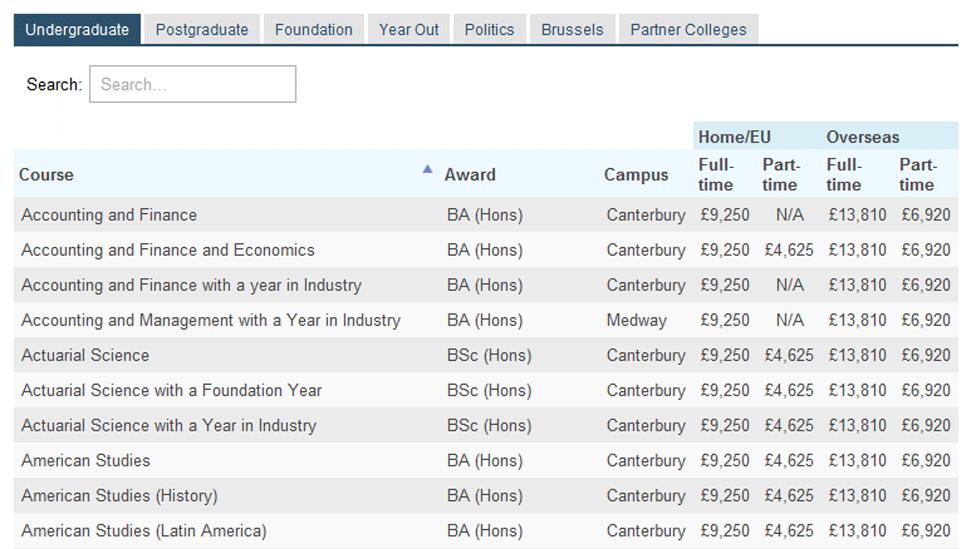
University of Kent fees for 2017 show courses being charged at a new higher rate
Manchester Metropolitan University advertises fees of £9,000 for 2017, but with a note that says "these fees are regulated by the UK government, and so may increase each year in line with government policy".
The University of Newcastle quotes a £9,000 fee but says it might increase with inflation for those entering in 2017.
Other universities, such as University College London, have so far not published fees for 2017 on their websites.
The increase in fees in England to £9,000 per year was introduced in 2012 by the coalition government and prompted angry protests from students.
In Scottish universities, students from Scotland do not have to pay tuition fees. Northern Irish students at Northern Irish universities have fees of up to £3,925 and Welsh students have fees of £3,810.
Sorana Vieru, vice president of the National Union of Students, warned of higher levels of debt for students.
"A further fee rise will have a damaging impact on students and it is frustrating to learn universities were lobbying the minister for the fee rise before the reforms were published."
A government spokeswoman said: "The teaching excellence framework will allow universities to maintain fees in line with inflation only if they meet a quality bar, as set out in the recent higher education White Paper."
- Published19 July 2016

- Published18 July 2016